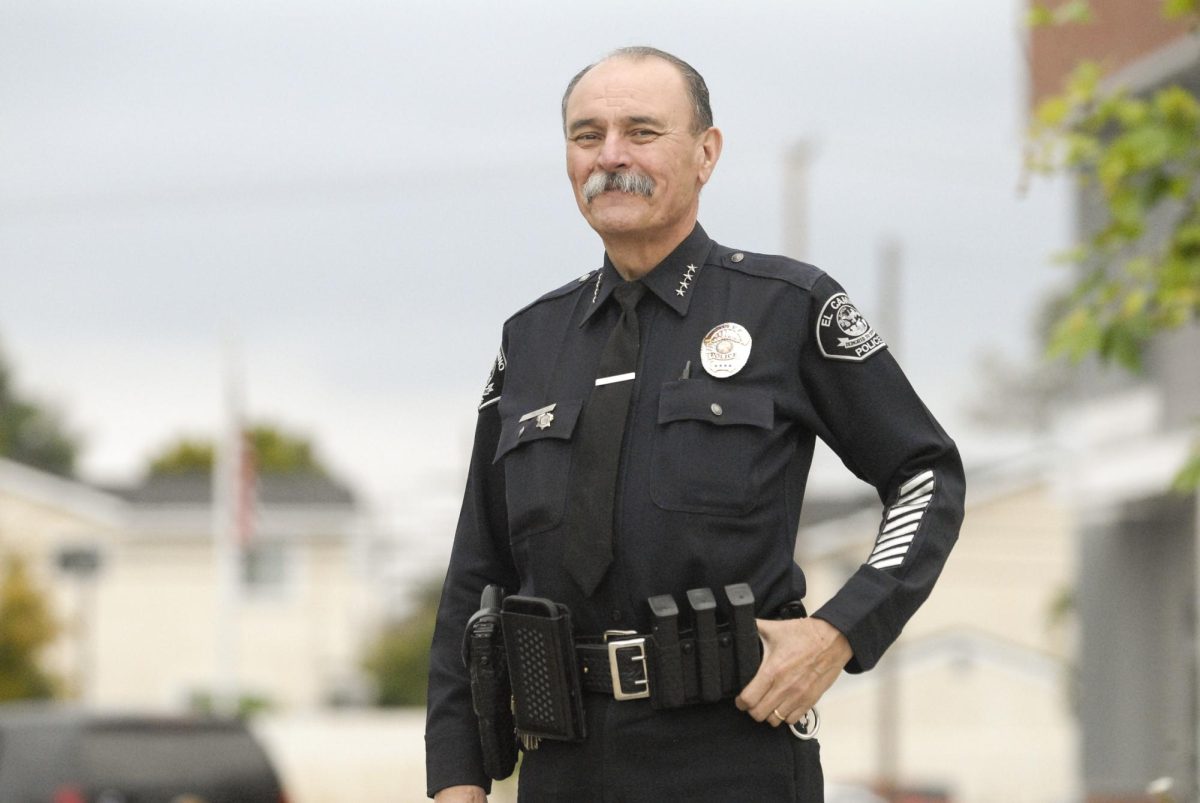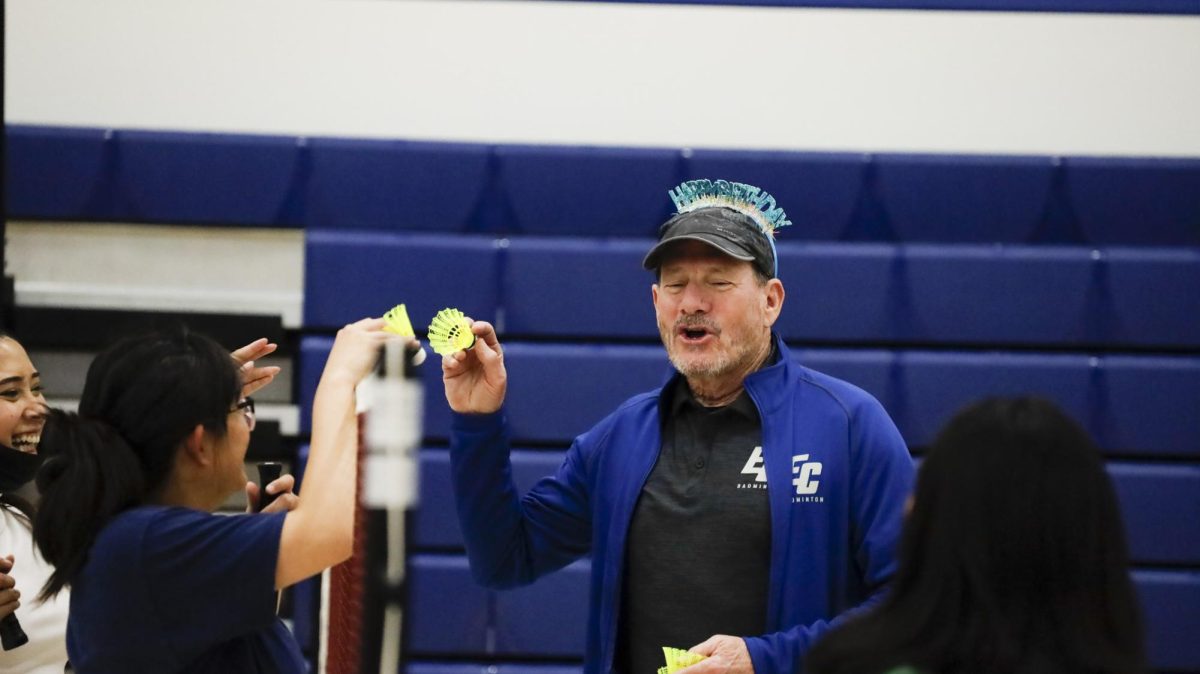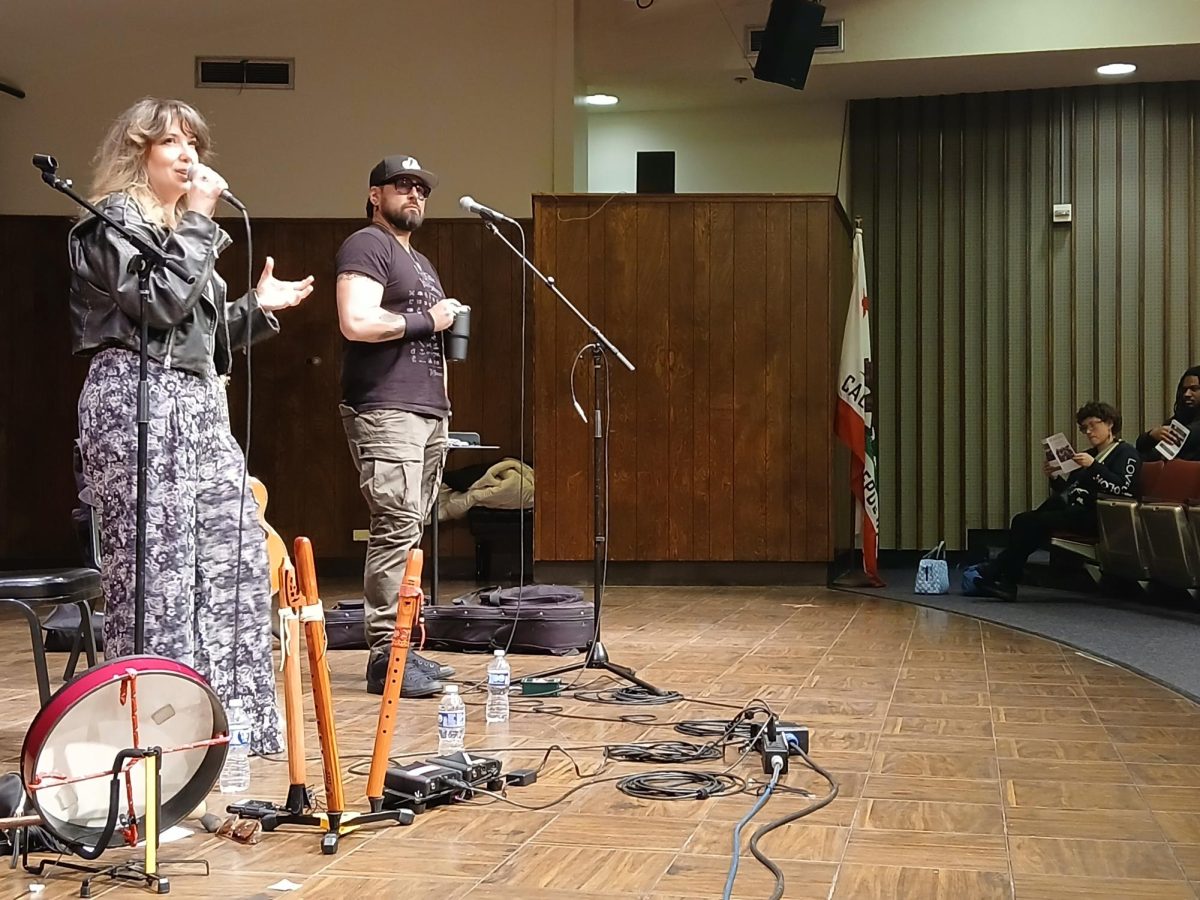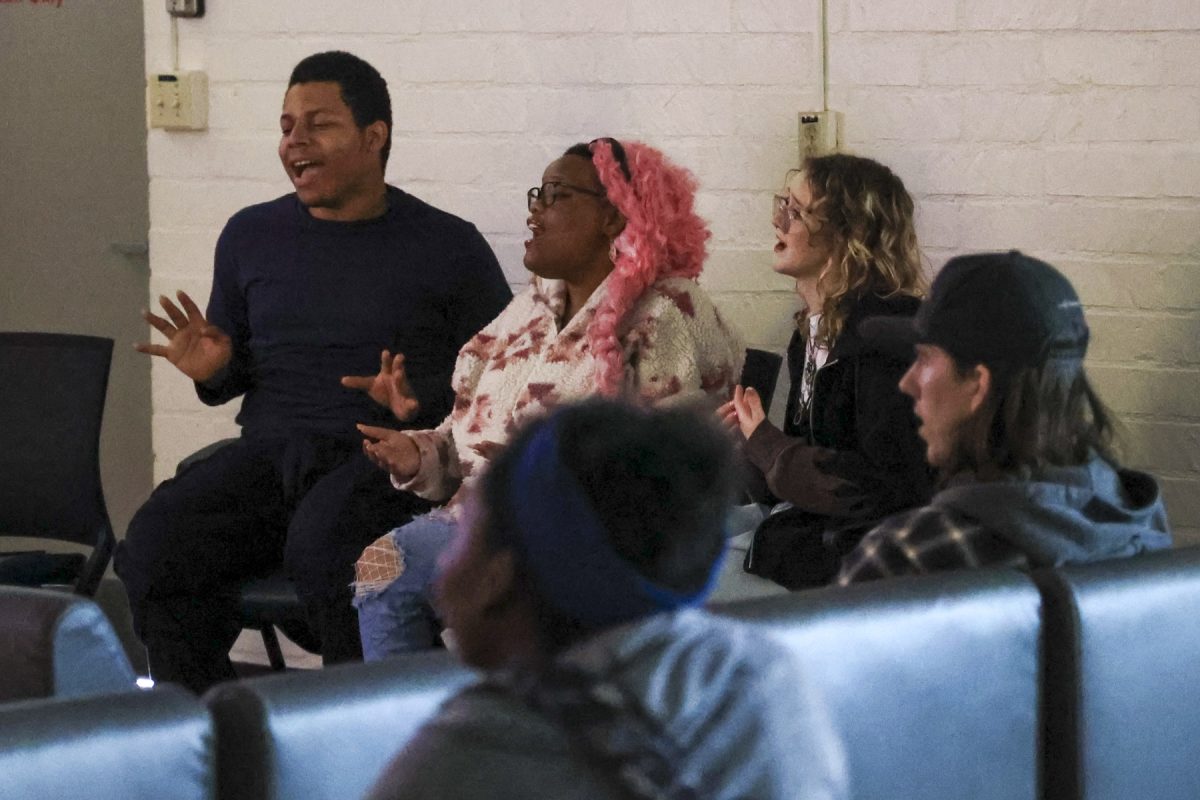Every morning, El Camino College’s police chief makes a very important stop on his way to work.
The donut shop.
Without fail, Police Chief Michael Trevis pulls up to Granny’s Donuts in Long Beach around 7 a.m., never missing a day.
“They know me at the donut shop…When I get out of my car and [the employee] sees me getting out of the car, it’s already ready for me,” he said.
After picking up his morning grub and hot coffee, Trevis heads over to El Camino, where he has led its police department for 16 years.
After 50 years working in law enforcement, Trevis, 69, prepares to bid farewell to El Camino as he retires at the end of June and leaves a great legacy behind.
“I’m going to miss El Camino College. I’m going to miss all the students, staff and faculty but it’s time to move on,” he said.
Police uniforms have stripes called hash marks, each representing five years of experience. Now that Trevis has 10 hash marks, he is ready to retire, he said.
“The four year old [in me] says, ‘Mike, you want that 10th one. You want that one more.’ Well, I got that one more,” he said.
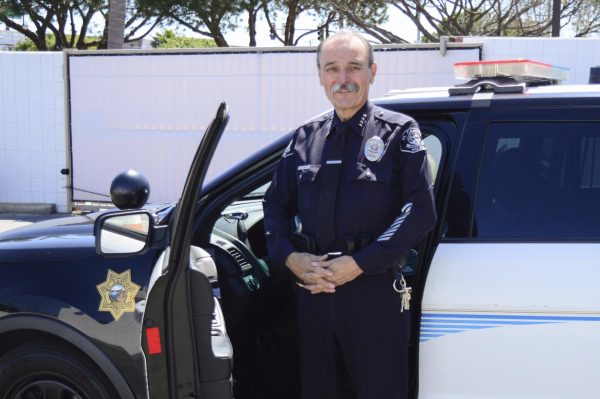
Trevis’ story begins in Boyle Heights, in the heart of East Los Angeles.
“We had an extremely diverse community there,” he said. “There were Russian people living there, Jewish people living there, there were Italian people living there, Black people…all kinds of people.”
Although his neighborhood was relatively safe, Trevis was told not to go to certain parts of the city, where gangs would reside.
“No vayas alla,” his grandmother would say. “Don’t go there.”
Trevis said there was an old man across the street named Fidel, who asked Trevis at seven years old to cut his grass. Trevis said yes, and the man gave him a silver dollar as compensation.
Excited about his prize, Trevis raced home, showing his grandma the coin. She took it and told him to save it.
“To this day, I’ve got it,” he said with a chuckle. “I’m glad she didn’t let me spend it.”
Trevis was inspired to become a police officer after growing up watching a ‘50s TV series called “Highway Patrol,” and a TV series from the ‘60s called “Adam-12.”
“It showed me…how a policeman officer should act,” he said. “The officers in those programs were very polite.”
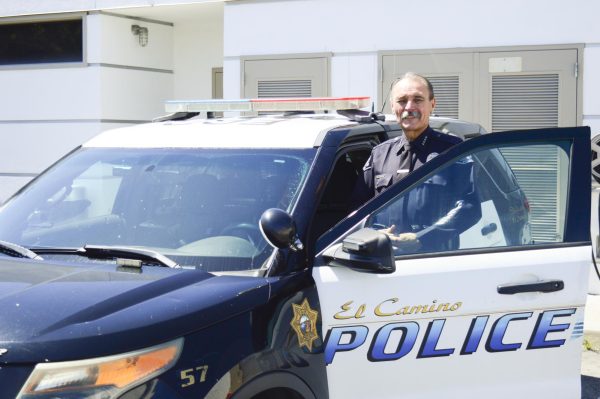
Trevis’ career began in 1969, around the age of 15.
He joined the Los Angeles Police Department Explorer Program, which provides training for youth interested in pursuing a career in law enforcement.
One day, during his training, Trevis was walking to the police station when two police officers suddenly came up to him. Within a few seconds he was on the ground, face in the dirt.
The officers, who didn’t know Trevis was part of the program, were laughing at him, saying things about his Mexican heritage. Eventually they let him go.
“I was fuming,” he said.
The next day, he went to the police station and filed a complaint.
“What I learned from that is, that’s messed up,” he said. “If you want change, sometimes you’ve got to get into the organization.”
After completing his training at L.A. County Sheriff’s Department Academy, Trevis was hired as a security agent for Los Angeles Unified School District at 20 years old.
His first assignment was at Woodrow Wilson High School in East L.A., close to his home.
From there, he would move on to work at several other schools and eventually city police departments.
During his time at Maywood Police Department, Trevis hosted workshops for elementary school students teaching them safety tips, including not talking to strangers.
Trevis’ career in law enforcement
1975: Wilson High School
1976: Garfield High School
1977-2000: East Los Angeles College Police Department
1977-1980: Maywood Police Department
1980-2002: Bell Police Department
2002-2005: Pasadena School Police
2005: Maywood Police Department
2006-2008: Huntington Park Police Department
2008-2024: El Camino College Police Department
At the City of Bell Police Department, Trevis moved up the ranks and became the chief of police in 1993, overseeing the department’s program and managing its budget.
While working in law enforcement, Trevis got his associate’s degree in administration of justice at East Los Angeles College.
He received his bachelor’s degree in public administration at the University of La Verne around 1988 and got his master’s degree in organizational leadership in 2008, also from the University of La Verne.
“You got to keep going to school,” he said. “Time and life and technology has evolved. So you have to keep up, you have to keep current.”
In 2002, Trevis went back to school districts as chief of police for the Pasadena Unified School District.
“Our job was not to arrest students,” he said. “Our job was to keep them safe and encourage them to continue their education and move on to college.”
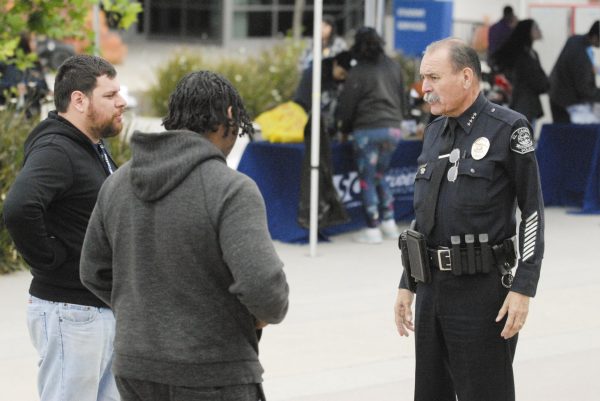
His favorite experience working in school districts was during his time at Pasadena.
One time, he said, there was a fight between two high school students of different ethnicities over “something stupid.”
The students were suspended and rumors began circulating the fight was racially-motivated, which sparked more fights on campus between the two groups.
When trying to resolve the issue, Trevis thought of who the students respected.
The answer? Grandparents.
Trevis reached out to several grandparents and invited them to come to the school.
“Suddenly the entire environment changed,” he said. “All of a sudden they’re very respectful, they’re not getting into fights anymore.”
Trevis said it was an accomplishment for him and was published in the Pasadena Star-News.
“There is a saying in Pasadena: ‘If you can cut it in Pasadena, you can cut it anywhere,’” he said.
In 2005, Trevis returned to Maywood as assistant chief, assisting with community relations and trying to improve Neighborhood Watch programs.
Trevis then left Maywood to join the city of Huntington Park as chief of police.
In Huntington Park, Trevis collaborated with the parks and recreation department, the explorer program and the chamber of commerce to improve community safety. He was also involved with graffiti removal, which was a prominent issue at the time.
In 2008 Trevis made his way to El Camino, replacing the previous chief Michael D’Amico, who died in 2007.
Kerri Webb, director of public information and government relations, said her first impressions of the chief were that he carried himself with authority and had a presence that was respectful, confident and comforting.
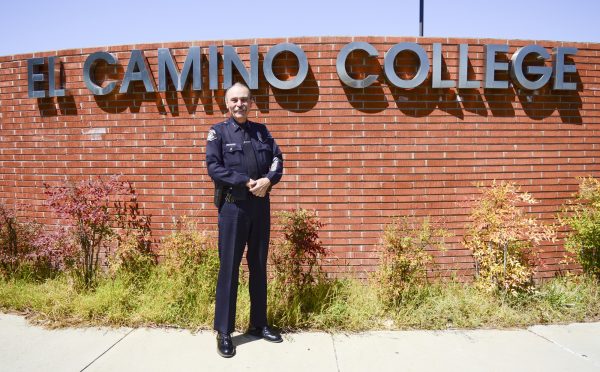
“He’s very important, [a] major player on campus but he’s also a friend, he’s a colleague. I’m going to miss his leadership, his presence,” she said.
Webb chose the following words to describe Trevis: tall, empathetic and loyal.
“He absolutely takes into consideration what the community feels and thinks and needs from the police department,” she said. “Chief Trevis is leaving an indelible impression and legacy here on campus.”
Communication between the police department and the surrounding community has always been central to Trevis.
Trevis has been part of several community outreach programs at El Camino including campus watch, where the police department hosts meetings with the campus community to hear their concerns.
“We are all about keeping the campus safe so that students can learn, teachers can teach [and] classified employees can do their jobs without fear,” he said.
Trevis encourages people to communicate as soon as something starts to happen.
“You know what’s going on where you live,” he said. “If you see something that isn’t right…call us,” he said.
His favorite part about working at El Camino has been the camaraderie and interacting with students, faculty and staff.
“There’s some wonderful people here, absolutely wonderful,” he said.
Sergeant Ruben Lopez has worked at El Camino for 18 years. 16 of those years have been with Trevis.
As a sergeant, Lopez assigns tasks to officers and supports the chief, making sure “what the chief wants is implemented correctly.”
Lopez said he’s learned a lot from observing and communicating with Trevis.
“Some of the key moments here have just been enjoying his leadership, learning from him…observing him and how he does things,” Lopez said. “The chief really makes it a point to communicate well.”
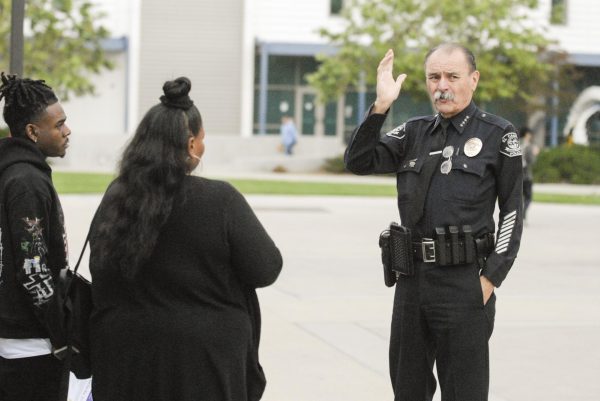
Lopez said Trevis has always encouraged officers to continue their education and training, and has encouraged Lopez to get his master’s degree.
“The chief has been great for everyone’s personal growth. If there’s been one thing the chief has always encouraged our officers…[it’s] don’t stop learning,” Lopez said.
Jeff Stephenson, vice president of Student Services, has only worked with Trevis for 10 months but said he’s appreciated Trevis’ role in keeping the campus safe.
“[He’s] very knowledgeable of police, of police services,” he said. “I really have appreciated his availability.”
Stephenson used the following three words to describe Trevis: genuine, caring and authentic.
“He’s always ahead of things, so usually I don’t have to ask him for anything because he’s already ahead of it,” he said.
Robin Dreizler, dean of Enrollment Services and former acting vice president of Student Services, met Trevis when he first arrived in 2008.
“He was outstanding in terms of letting his superiors know anything and everything that was happening on campus,” Dreizler said.
Dreizler used three words to describe Trevis: honest, integrity and approachable.
“He’s everything you’d want in a chief of police,” he said.
Trevis has been celebrated throughout his career with several awards and recognitions.
Around 1985, he received an Officer of the Year Award from Bell Police Department. He was also recognized for being one of the founding members of the National Latino Peace Officers Association San Gabriel Valley Chapter.
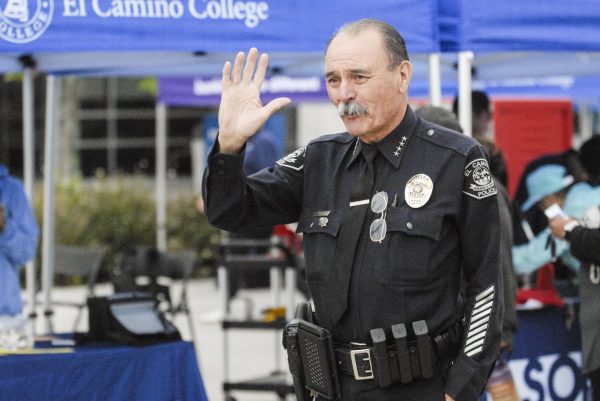
As the first in his family to join law enforcement, Trevis eventually inspired his sister to become a police officer, and she went on to work for the Los Angeles Police Department.
Trevis said the most challenging part of his career has been managing people.
“You’re managing human beings. It’s like being at home, you know, you’re trying to manage your family and stuff like that…it’s not always smooth,” he said.
The scariest experience in Trevis’ career was one day while he was on patrol for Bell Police Department.
There had been a gang-related shooting and the victim who was shot was taken to St. Francis Medical Center in Lynwood.
Trevis and his partner were in the emergency room with the victim and his family, who wouldn’t identify the shooter. Trevis eventually left the room and started to walk down the hall when all of a sudden he heard people screaming in the emergency room.
The gang members had followed the ambulance to the emergency room, ready to finish the job. When they saw Trevis coming back, however, they ran.
It turned into a pursuit, and eventually the gang members stopped their car at a park.
One of the gang members got behind some bushes. Trevis and his partner got behind some trees.
“We’re yelling ‘give it up, give it up, give it up,’ we’re calling for backup,” Trevis said.
Then, a bullet whizzed past his ear.
“I looked at my partner and go damn it, there’s mosquitoes around here. She goes, ‘Those weren’t mosquitoes. The guy took a shot at you,’” he said. “Then I got scared…just thinking if I had turned my head just a little bit, he’d have got me.”
Working as a police officer also means seeing some grotesque things, Trevis said.
“What a human being can do to another human being is unconscionable. I’ve seen murder victims in horrible, grotesque situations. I’ve seen people commit suicide,” he said.
Trevis said he encourages officers to seek peer counseling and police psychologists.
“You’ve got to let it out. You can’t keep this stuff in you,” he said. “It will drive you crazy, trust me, it will…I’ve seen officers that kept it in them, and they wound up medically retiring.”
Trevis said some of his favorite moments of his career have been running into people he’s arrested or interacted with in the past.
Last year, Trevis was at Walmart when he heard a “big man” call his name. The man had been arrested by Trevis a while ago and had just gotten out of jail.
His response was not what Trevis expected.
“He thanked me for treating him with courtesy and respect,” he said.
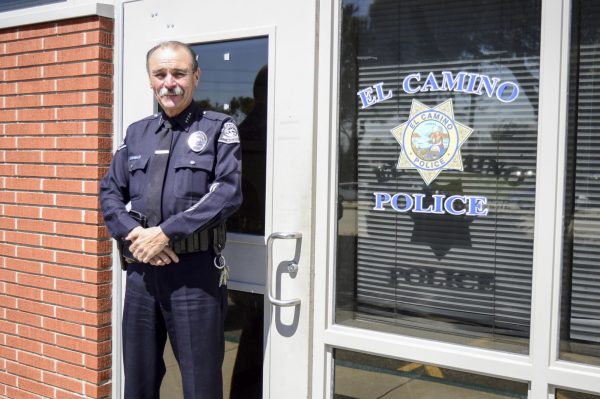
Once he leaves El Camino in June, Trevis hopes to work part-time as an interim chief at another school.
“I’m kind of a workaholic,” he said. “I want to keep myself busy, I don’t want to do nothing.”
Trevis said he might finish his doctorate degree, since he completed the coursework for it but not his dissertation.
While he will miss El Camino, Trevis said it is time for the police department “to have some change.”
“The new chief that comes in here, they’re going to have new ideas,” he said. “The time is right. So as much as I really wouldn’t want to [leave], I know it. It’s time.”



